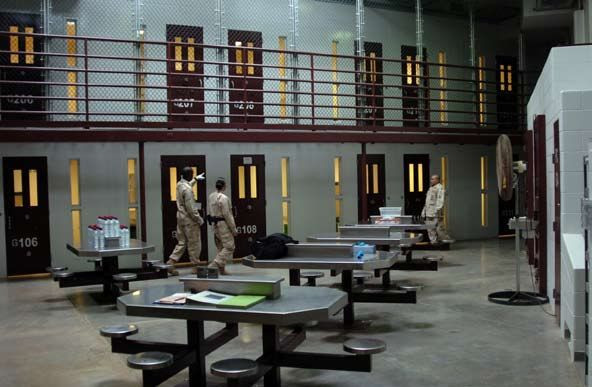California Prison Hunger Strike: 30,000 Inmates Protest Solitary Confinement Conditions At Pelican Bay

Of all the prisons in all the land, California's state prisons have developed a reputation for being some of the most treacherous. From prison overcrowding to inadequate health care, California inmates have had enough. This week, nearly 30,000 inmates turned down their plates for a hunger strike in an effort to make their voices heard.
The protest was organized by a group of inmates at Pelican Bay State Prison who say that the current state of California prisons pose a threat to the safety and security of the prison population. Of paramount importance to the protesters are the conditions in Pelican Bay's solitary confinement, also known as Security Housing Units (SHUs). The hunger strike, which includes work stoppages as well, seeks to put pressure on California Gov. Jerry Brown and the California Dept. of Corrections and Rehabilitation to stop the state's practice of long-term solitary confinement.
What is Solitary Confinement?
Inmates deemed a threat to the security of a prison are placed in solitary confinement. Solitary confinement involves placing prisoners in a cell alone for 23 hours a day. They have very limited contact with human beings, limited phone access, and limited access to rehabilitative programming. In more extreme circumstances, inmates in solitary confinement may be placed in physical restraints, have restrictions on the type of reading material they're provided, or experience violence at the hands of prison guards. In California alone, over 11,000 inmates are housed in isolation.
Mental Health and Solitary Confinement
In October 2012, Dr. Craig Haney told the Senate Judiciary Subcommittee on the Constitution, Civil Rights and Human rights that the nation's 80,000 inmates in solitary confinement are "at grave risk of psychological harm."
According to the American Psychological Association, Haney was part of a committee studying the high rates of incarceration in the United States. As part of his research, the psychologist observed the subpar conditions in solitary confinement across the nation, which included cells that were "scarcely larger than a king sized bed." Haney found that the prolonged state of being confined to that small space without human contact "for some prisoners... precipitate[d] a descent into madness."
While some enter isolation sane and come out with serious mental health issues, many believe that inmates with psychiatric disabilities are consistently placed in solitary confinement. Mental Health Alternatives to Solitary Confinement (MHASC) is a coalition of organizations devoted to preventing prison officials from simply placing inmates with mental health needs in solitary confinement because they are easier to manage in isolation.
"Vulnerable prisoners are subjected to sensory deprivation, social isolation, and enforced idleness - conditions that are extremely harmful to anyone's mental health but devastating, and even life threatening, for people with psychiatric disabilities," the coalition wrote.
California's Prison Hunger Strike
Prison officials have acknowledged that a growing number of prisoners missed at least breakfast and lunch on Monday and Tuesday, but maintain that the facilities have operated as usual. "Everything has been running smoothly," said California corrections spokeswoman Terry Thornton. "It was normal. There were no incidents."
Earlier this year, a federal judge refused to dismiss a lawsuit filed by 10 Pelican Bay inmates who were held in isolation for 10 years or longer. The inmates said that the conditions in the SHUs constituted cruel and unusual punishment, violating their constitutional rights. The case may be turned into a class action.
As for the hunger strike, the protesters are seeking for the California Department of Corrections and Rehabilitation to fulfill five core demands.
The Pelican Bay Five Core Demands:
1. Eliminate group punishments and administrative abuse.
2. Abolish the debriefing policy and modify active/inactive gang status criteria.
3. Comply with the recommendations of the U.S. Commission on Safety and Abuse in America's Prisons recommendations and end long-term solitary confinement.
4. Provide adequate and nutritious food.
5. Create and expand constructive programming.



























